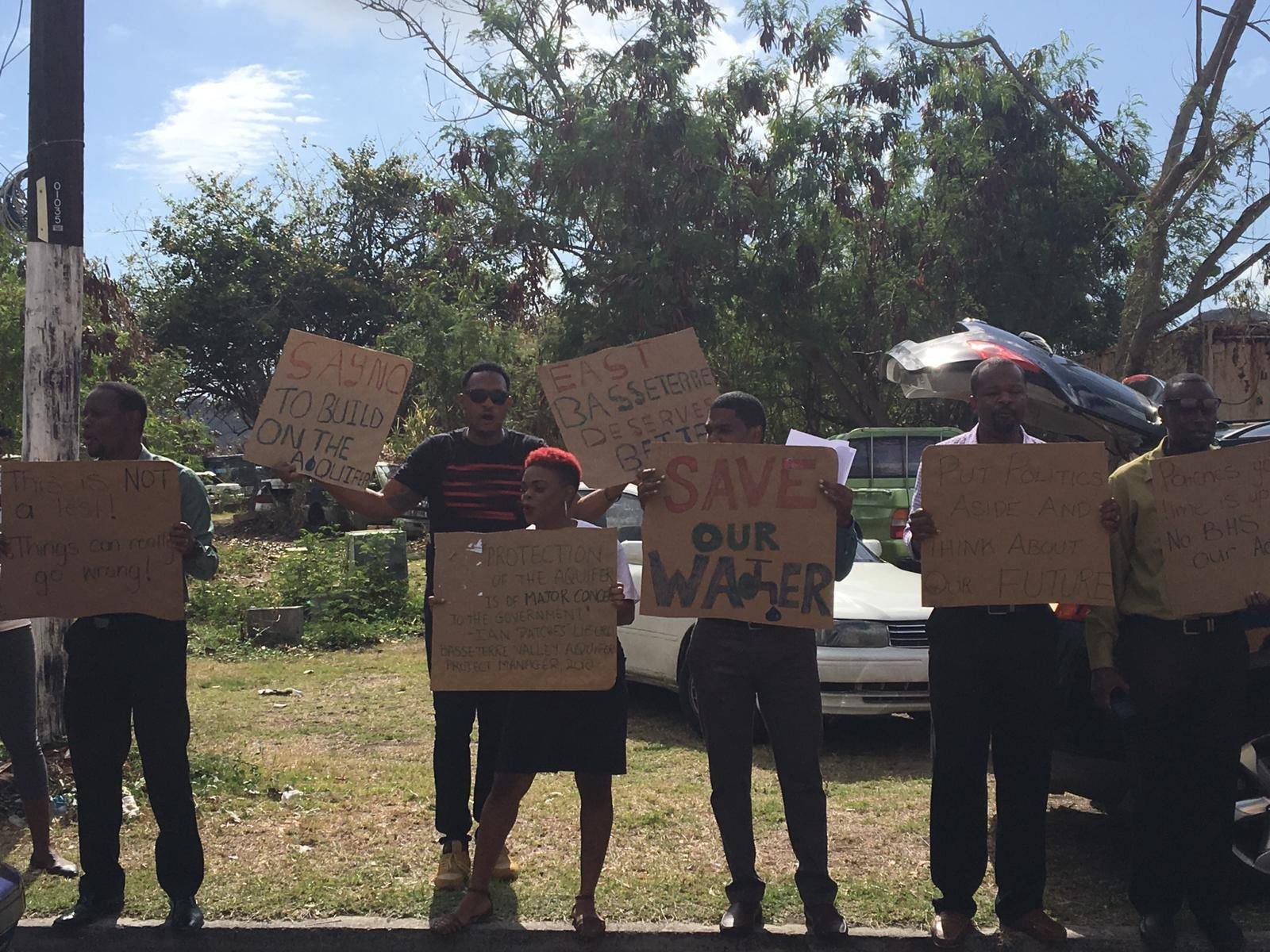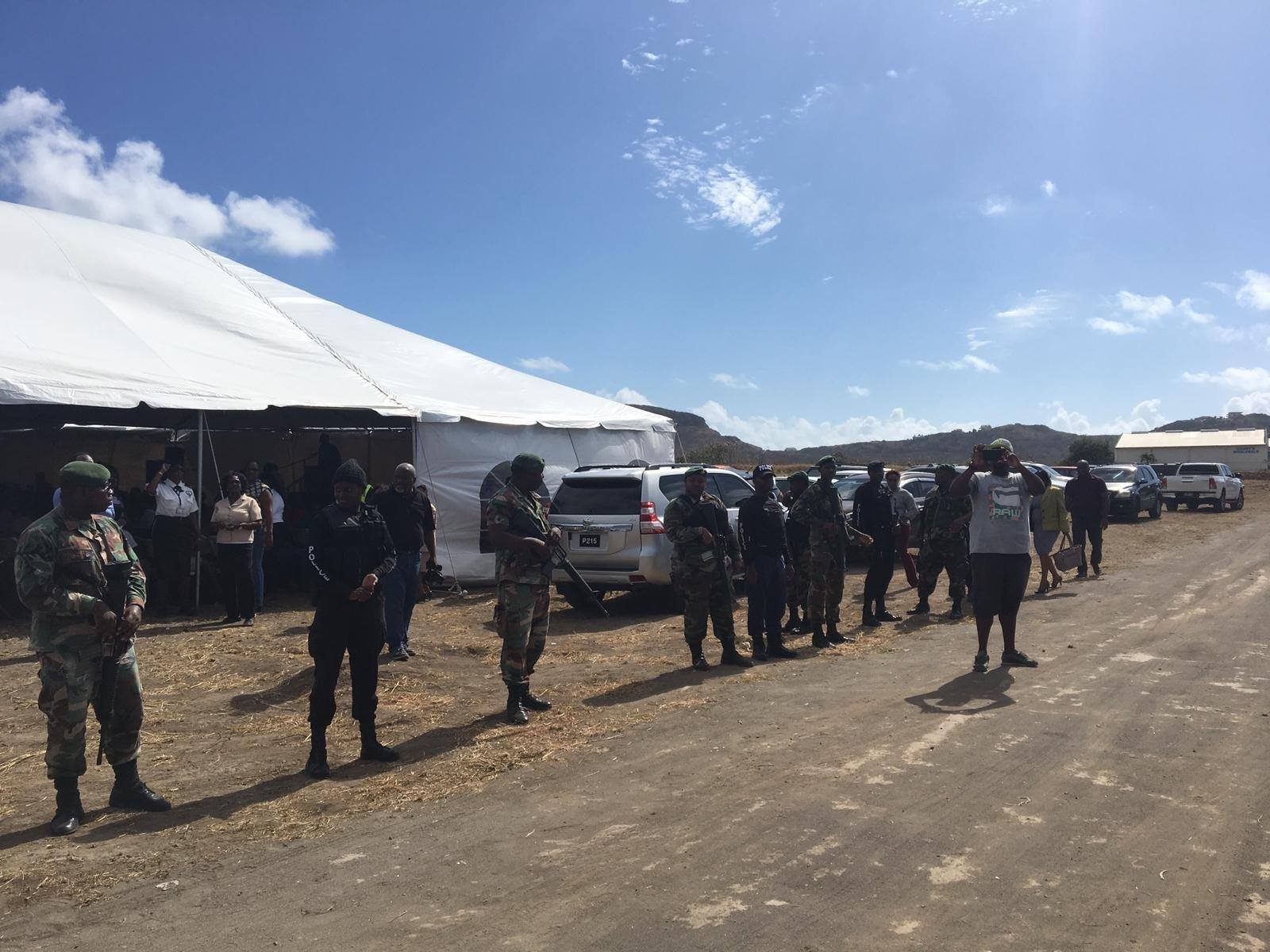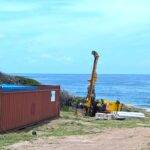
Photo Caption – Protesters in the vicinity
380/2019
By: Erasmus Williams
Basseterre, St Kitts, May 2, 2019 – Facing several police and soldiers of the St Kitts-Nevis Defence Force with large guns, one woman was arrested Thursday during a protest against the government’s decision to build a new Basseterre High School on the Basseterre aquifer.
Nerys Chiverton, who was on the fringes of the tent where the ceremony was being conducted to unveil a 3-D rendition of the project was said to be holding a placard denouncing construction on the site and voicing her displeasure with the government’s decision, when she was whisked away by authorities.

“There are reports that some measure of force was used to arrest her,” Kyss 102.5 FM reported.
Several persons holding placards were also protesting the highly controversial project which has been criticized by several persons and the opposition St Kitts-Nevis Labour Party (SKNLP). Some placards read: “Save our Water,” and “Protect the aquifer..Save Lives.” Kyss FM said Chiverton was taken to the Basseterre Police Station and her legal team is working on securing bail for her.

Photo Caption – Army with guns in front of the tent where the unveiling took place
Protesters including several representatives of the St Kitts- Nevis Labour Party denounced construction of the new school on the site.
Deputy Leader of the Labour Party, Hon. Marcella Liburd indicated that her protesting was not about a political statement but about the preservation of life. She noted that her party was not opposing the construction of a new school but were opposed it being constructed on the aquifer.
The opposition believes the school should be rebuilt on the old site.
The Trinidad-based Caribbean Public Health agency (CARPHA), the Trinidad-based Caribbean Industrial Research Institute (CARIRI) and the Washington D.C.-based National Institute for Occupational Safety and Health (NIOSH) have submitted independent reports that the old Basseterre High School site can be reutilized after remedial works were done.
“There is enormous risk to the aquifer in using the proposed site. There is irreparable damage that can be done to our largest water source which is already under threat and the history of lack of maintenance,” are among concerns of Victor Williams, a well-respected planner and architect and a former chairman of the Development Control and Planning Board.
Williams has expressed concern over the 16,000 gallons of effluent that will be generated each day of operation at the school.
“My concerns are: Where will the effluent be pumped to? Where will the released effluent be deposited? How can we guarantee an odorless discharge? How will it impact property values in the discharge area? For this process to function well, we will need a sophisticated system. How well will it be maintained,” he asked.
He said Member States of the United Nations including St Kitts and Nevis in 2000 have all committed to the fulfillment of the Millennium Development Goals. They have set timelines for adhering to the provisions of the said goals by 2030.
He noted Goal #6: Clean Water and Sanitation- Reducing water pollution and ensuring access to clean and affordable drinking water are both main targets. By achieving Goal #6 the other goals will be attained. Proper water sanitation and distribution will aid in reducing diseases and improving the health of the population.
“One must therefore conclude that building a school on the Basseterre aquifer is risky, careless, reckless and irresponsible. It runs against the laudable aims to achieve healthy living for all,” he said.
Former Chief Medical Officer, Dr. Patrick Martin has made a passionate appeal to the Timothy Harris-led Team Unity Government not to build the new Basseterre High School on the aquifer, which provides over 2.5 million barrels of water daily to residents of Basseterre and its environs.
“Water is Life: Err on the Side of Science,” noted the practising veteran paediatrician who added: “Without water, humans die in less than a week. Access to safe water is a human right and vital for the sustainability of the Federation’s development.”
“My government faces a choice: follow a campaign promise and risk contamination of the aquifer or let science inform policy and enforce the protected area status of Ponds-Needsmust. To err on the side of caution means to choose the safer of two options which is the latter,” said Dr Martin.
“The risks to life and property are too great. This is the right time for the government to adopt the precautionary principle and do not build on the Aquifer. To do otherwise will create untold hardship for present and future generations. A word to the wise is enough,” warned Glenroy Blanchette, a lecturer at the Clarence Fitzroy Bryant College (CFBC), a trained geographer and Disaster Management Specialist.
He noted that in 2011, the Denzil Douglas Labour administration designated the Basseterre Valley Aquifer area a national park in order to protect the Aquifer and the well field.
Disclaimer
*This article was posted in its entirety as received by SKN PULSE. This media house does not correct any spelling or grammatical errors within press releases and (or) commentaries. The views contained within are not necessarily those of SKN PULSE.












